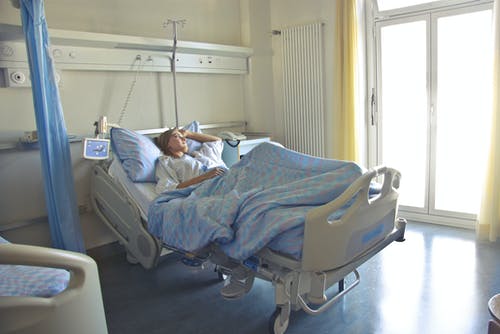A couple of weeks ago I had the honour of being a part of delivering an eating disorders training day for doctors on the General Medicine ward of a hospital in Brisbane.
My role was to provide insight from a “lived experience” perspective on the topic of how doctors can better understand and communicate with their patients with eating disorders during medical admissions.
I was expecting to go along and talk easily on this topic because having lived through it and having now worked with hundreds of others living it and their families, I am confident I have a good grasp on what’s useful and what’s not useful.
I was expecting to go along and talk candidly about the experience of being hospitalised with anorexia nervosa. That time in my life is so far from the life that I live today that it honestly feels as though it was never a part of my life to the point where most of the time when I think back on those years it feels as if it happened to someone else.
Which is perhaps exactly why what I wasn’t expecting was to cry.
Spoiler alert, I cried.
Someone kindly went and found me a box of tissues and I continued talking, breathing, remembering, sharing.
I continued trying to help.
Trying to help each of the more than 50 doctors in that room to understand they are in positions of immense power to change things for people living with eating disorders and how to use that power positively.
Trying to help these people to go on to be capable of helping their patients in a way I never experienced.
I looked around at the faces, at all the sets of different colour, size and shaped eyes in that room and I had one of those moments of realisation that there was no way these people could truly understand the depth of pain I experienced during those hospital experiences. Not just my hospital experiences but the countless sharing’s I’ve heard since from many of my clients about their hospital experiences because unfortunately traumatic hospital experiences seem to be the norm rather than the exception in eating disorder treatment.
There was no way they could understand the terror, frustration and utter shock of having an innocuous sandwich put in front of you and realising you, in fact cannot eat it. Not even if someone were to offer you a million dollars to do so.
There was no way they could understand the depth of the loneliness, the self-loathing and utter panic of being threatened at every turn with a nasogastric tube if you didn’t comply (aka if the illness had you so terrified that you were unable to eat the food given).
There was no way they could understand the fear, humiliation and utter shame of having to beg to be wheelchaired outside so you could feel the sunlight on your face for the briefest snippets of time.
Almost instantaneously as the realisation they could not understand I was also hit with a deep sense of relief.
I was glad to know this.
I am glad to know the pain behind being hospitalised with anorexia nervosa is one many people will never experience.
I listened to the mum of a daughter with an eating disorder speak about their experience with the hospital system during her daughter’s admissions. I listened to the anger, the sadness and the disbelief behind her words as she shared how the “system” she had always been proud to be a part of (she is a doctor at the hospital we spoke at) had let them down and my heart broke.
I remembered watching my own mum sleeping awkwardly beside my sweat soaked bed on a small plastic chair, under fluorescent lights and surrounded by beeps, the smell of antiseptic and the constant fear that at any moment it may all be over, that her daughters starved heart may finally have had enough.
While I no longer take my poor treatment as a personal failure, I do feel sad for my past self for having gone through that. I feel immense compassion for all those that have and are and will go through similar experiences. Which is exactly why I want to share this post because those experiences were completely unnecessary. They often are.
I remember lying there with a canula in my arm, chords stuck all over my chest whilst deliriously having my bloods taken at 3am, parts of my body hurting in ways I didn’t know a body could hurt but my mind the worst of them all. I remember thinking “there has to be a better way.”
Now I know a better way.
All my work, be that one-on-one with clients, speaking at trainings, seminars, events, on podcasts and these blogs are my contribution to creating a better way. To ensuring some people and eventually all people living with eating disorders have a different experience of care to what I had.
They are my contribution to being a part of changing the treatment of people with eating disorders.
Currently the rates of death amongst people living with eating disorders are phenomenally high and the morbidity even more so.
The treatment of eating disorders is actually much less successful than the treatment of other mental disorders. Statistically less than half (46%) of those who become sick with anorexia nervosa ever fully recover, about 30% partly recover and around 20% remain living with AN chronically1.
Eating disorders are often thought of as being notoriously hard to treat because there are so many components to them, and this may be true but given that there is so much more we could do and so much we are doing that we could do better I believe it is not out of our grasp to drastically alter these statistics.
These statistics are people. These statistics are people’s lives.
As with any change, the change starts with you.
If you are in a position to treat someone with an eating disorder and have ever struggled with how to engage and connect with them to deliver the treatment you are trained to here are 5 tips you may find useful. These tips are just the tip of the iceberg of the myriad little ways you can better assist your patients along the part of their journey you get to be a part of.
Read them, try them out. Discover for yourself the power you have to truly be a part of changing a life.
5 Small Changes in Treatment Which Could Have Made Things Different
- “I know it’s so hard right now, but we are here to help you get where you want to be.”

I cannot stress enough how important the language you choose to use with your patients is.
People with eating disorders are confused, ashamed, embarrassed and quite often given up hope or near enough. They are not being stubborn or sneaky. They are not trying to trick anyone.
What they are doing is their best.
That may look different from your best.
Let’s be honest their best looks absurd.
But that’s to be expected because they are suffering from something you can never understand and that’s ok. People can suffer very much from things you do not understand. Very much.
Your not understanding does not make that suffering any less valid or any less real.
When I was hospitalised, everything was presented as a threat or a punishment (and I was the most compliant patient ever so I shudder to think how anyone with any spark remaining or less compliant than myself would have been treated).
It was a given that I would be difficult. I was treated almost as a non-human. I had no rights, no say, no involvement in my care.
Everything was done on me and happened to me.
I was told what I could and couldn’t do.
No ifs, no buts, no exceptions.
If I couldn’t do it or even showed a hint that I was having trouble then I was being purposefully and intentionally difficult, manipulative and simply not trying.
I’d have loved it so much if someone had of said to me “if you can’t manage the food that’s ok, I can get you a Resource and if that’s too hard I can arrange a nasogastric tube until you are able.”
That is lightyears away from the reality of how the “options” were presented.
Your understanding is not necessary, your compassion is. Which leads us to tip number 2.
2. “How are you today?”

Yeah, I know this one may seem self-explanatory and a common courtesy but not once was I asked this question or any questions about my wellbeing for that matter.
I felt less than human.
I felt like some kind of interesting insect or alien. Nurses and doctors talked about me but never to me.
I lay there with my eyes open and staring right at them shame burning in my body or with my eyes closed trying to stop the tears, it did not matter the way I was treated was interpreted by my starved and scared mind as I wasn’t worth their time or energy.
If you have a patient with an eating disorder, ask them how they are.
In fact ask them anything about themselves.
First and foremost, let them know you care about them as a human being.
Let them know you see them beyond the eating disorder.
In the words of A. H Almaas
“Only when compassion is present will people allow themselves to see the truth.”
And only when people allow themselves to see the truth can they begin to go about finding means of learning and creating a different way of doing things. Which is the whole purpose of your treating them after all, is it not?
Do not lose sight of your role.
It is for them.
So please be for them.
3. “Do you have any questions or anything you would like to know?”

Communicate with your patient.
Rather than speak about them or over them communicate with them.
Involve them in their treatment (as you would any other patient).
Remember they are afraid, and it doesn’t matter how they are presenting this fear be it anger, indifference or sadness at the core of what they are experiencing is fear. Unrelenting fear. I know because I’ve been there.
Brief explanations of what is happening and why make a world of difference.
Ask them questions such as “do you understand what’s happening and why we are doing this or that test?” or “Is there anything that you’d like explained better?”
Let them know the reasons things are happening the way that they are.
Let them know there is a plan for their treatment.
With a plan recovery becomes possible.
In the end they are the ones who must go home, they are the ones who must go back out into the community and they are the ones who must go back out into this life. They already feel incredibly alone, different and uncared for. Please don’t be a part of exacerbating or reinforcing that, it will just delay or realistically entirely prevent their recovery.
Be a part of showing them the world they are trying to recover into is a kind one, a meaningful one, one worth recovering into.
4. “How do you think we could best help you through this part of your recovery?”

To frame anything, you say to a patient in terms of what you can do for them or what they think will help is perhaps the single most powerful thing you can do.
It is showing them directly that you see them, that you are on their team. This is light years away from simply telling someone that treatment is for them because let me tell you when all your rights as a human are taken away from you and everything is forced upon you (even things you want) it does not feel as though it is for you.
To have someone ask what it is you would like is life changing.
I can share with you that it took almost 15 years of multiple therapy routes, multiple hospitalisations, multiple recovery attempts and boundless pain for someone to ask what I wanted. By that stage it was incredibly hard for me to think of let alone put into words what I did want because I was so uncertain and so unsure of myself, what I was worthy of and ultimately what was and wasn’t possible.
Please ask your patient what it is they want and how they think you could be of help in assisting them to reach this.
You may be surprised by what they answer.
5. “Is there anything we can do to make this easier for your family?”

When I think about the years I spent living with anorexia one of the biggest darkest blotches is the effect it had on my family.
I struggled.
They struggled.
At the time this knowledge destroyed me. Now, looking back I see that a lot of their pain wasn’t mine to take on.
The guilt and shame of the pain I was causing my family did not magic me out of the illness (as you’d imagine it would). It had the opposite effect. It drove me deeper into it.
The deeper I went the braver a face I put on.
It made me stifle my truth. It kept me from addressing the truth, kept me from spending my energy on me and ultimately kept me from healing.
It made me outright lie.
I never saw a health professional put any time or effort into helping my parents.
During one of my hospitalisations my mum flew to be with me. She stayed for over two weeks and during that time not once did a nurse, doctor or other worker at the hospital enquire about where she was staying, if she’d like help with anything or even how she was doing mentally and physically.
What they did tell her was that she couldn’t stay the night with me in the hospital.
What they did tell her was that she couldn’t bring me any food.
What they did tell her was that she couldn’t eat in front of me.
What they did tell her she was too distressed to be around me and threatened to stop her visiting me.
She was lumped in with me. A part of the “problem.”
She wasn’t, she was my lifeline to reality.
Seeing my mum treated so poorly added an incredible level of heaviness to my already stressed to capacity mind and body. I spent all my brain capacity attempting to take care of her including making sure she had a car to drive and a place to stay. This was all a monumental feat that I can only appreciate in hindsight. I have no idea how I managed it.
Help family members in any small way you can.
They are not the problem.
They are exhausted.
Take Home Messages

What I’d love to finish off by making abundantly clear and I shared this at the training talk also is that it is unlikely that their hospitalisation will be the thing that cures someone with an eating disorder.
It is highly unlikely that the doctor, nurse, carer, pharmacologist or dietitian within the hospital will be the person to help their patient reach recovered.
There simply isn’t the time or capacity for this to be so. The medical ward of a hospital is for acute care. It is a place to go for the smallest period of time possible until all your vitals are stable, but the human care could make all the difference in the world.
I remember what various health professionals said to me and more often about me in hospital.
I remember what was done and above all else I remember how it felt.
I wish I could say these memories are positive or inspiring, but they aren’t.
They are horrible, traumatic, and soul destroying if I were to put it lightly.
The single positive memory I have of my hospitalisations was when a volunteer asked if I needed anything and I very nervously said I would love something I could draw with if that would be possible, but it is ok if it is not too much effort, I don’t want to be an effort and few days later she reappeared with pencils, a sketch pad and a couple of water colour paints. That tiny act of kindness blew my mind. I was pathetically grateful.
As I write this, I imagine what it may have been like to have had a doctor or nurse show me even a 10th of that compassion.
I will never know the difference it could have made.
At the end of the day there is more to treatment than simply “applying” it.
This is true for eating disorder treatment and it is true for the treatment of any other mental or physical health illness or injury.
The delivery matters.
The care matters.
The biggest takeaway I realised after being a part of this incredibly valuable training day, not only from what I shared but also from what the other speakers shared was the encouragement to treat people with eating disorders as you would any other patient, as human beings.
With my whole heart I hope you found this information useful and inspiring.

Become Great. Live Great.
Bonnie.
Reference
- Arcelus J, Mitchell AJ, Wales J and Nielsen S. Mortality rates in patients with anorexia nervosa and other eating disorders a meta-analysis of 36 studies. Arch. Gen. Psychiatry 2011. 68, 724–731.




2 thoughts on “How to Help: 5 Essential Questions to Ask Your Patient with an Eating Disorder”
this is so great
Thank you Anna. Some valuable information in there for sure <3